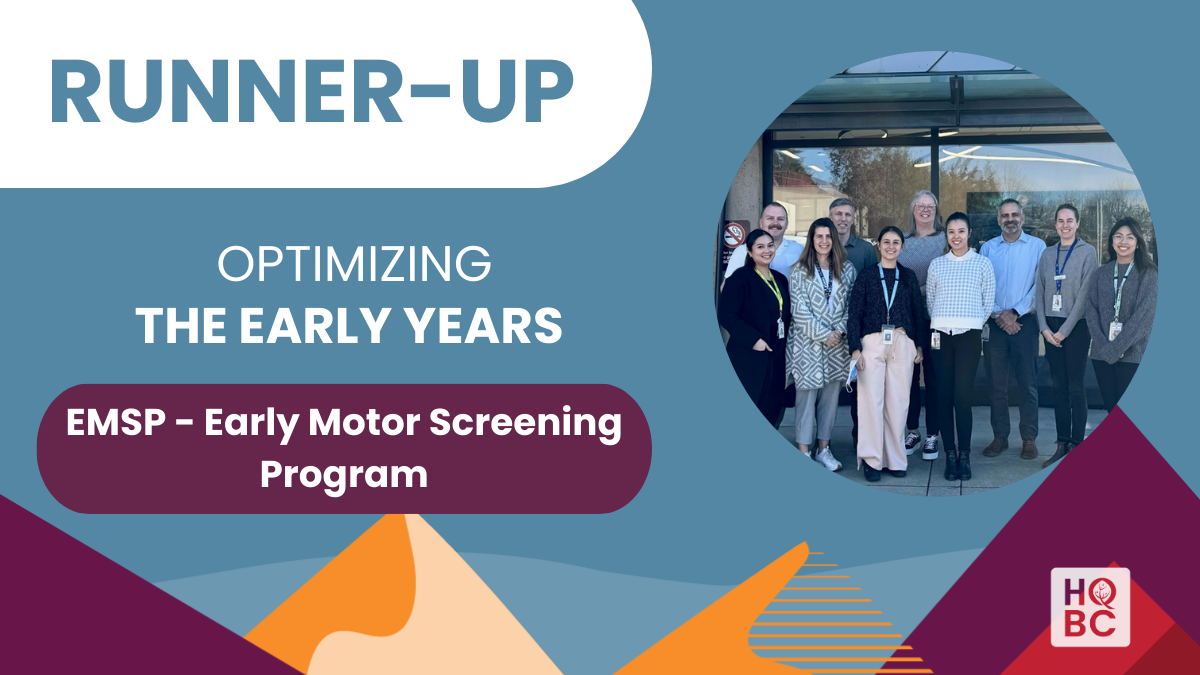- 2025
|
- Runner-Up
|
- Optimizing the Early Years
Cerebral palsy (CP) is the most common physical disability in children, affecting 2.1 per 1000 live births in developed countries. International guidelines have enabled accurate CP diagnosis as early as 3-6 months corrected age with evidence-based assessments. Nevertheless, the average age of CP diagnosis is 18.9 months in Canada and 25 months in BC, and 23 months in high-risk infants. Growing evidence demonstrates that earlier CP diagnosis leads to earlier CP-specific interventions, maximizing the potential of gaining motor functions by optimizing neuroplasticity at a younger age.
However, the lack of standardized CP detection and diagnostic care pathway in BC prior to 2022 remains a challenge that hinders implementation of best clinical practices. Children at risk for CP face systematic challenges to points of detection, diagnosis, and early intervention as a result. Delay in diagnosis has significant impacts on health outcomes, and is associated with increased parental stress, depression, and dissatisfaction toward health care.
The establishment of the family-centered CP detection care pathway and the intake criteria of the Early Motor Screening Program (EMSP) were directly informed by evidence review and expert recommendations from the BC Cerebral Palsy Advisory Committee (BCCPAC) – an interdisciplinary panel of parent advocates, pediatricians, physiotherapists, neurologist, neonatologist, and health care administrators established in 2017. This working group highlighted the urgent care gap for CP detection among high-risk infants in BC. Adapted to align with the existing Tiers of Service framework, this Tier-6 service follows the evidence-based care algorithm recommended by the American Academy of Cerebral Palsy and Developmental Medicine (AACPDM).
The EMSP launched in June 2022 at Sunny Hill Health Centre, BC Children’s Hospital, as the first-of-its-kind selective screening program for CP; filling the identified early detection gap. In partnership with Perinatal Services BC, the EMSP has made BC the first jurisdiction in the world to have a provincial screening program for CP.
The EMSP consists of a group of trained professionals who conduct the Prechtl General Movements Assessment (GMA) on identified high-risk infants for CP between 3-4 months corrected age. GMA is a validated predictive tool for CP that identifies certain movement challenges by 4 months post-term age. The EMSP clinicians conduct GMA by scoring a two to five-minute-long video of the infant lying on their back while they are awake and calm. The video can be recorded in the clinic or home setting. Comments from caregivers have illustrated that they appreciate the virtual accessibility, “I appreciated not having to go to an in-person appointment. The zoom call worked well and I was able to understand what was being shared and was able to share my own thoughts and ask questions.”
In collaboration with Provincial Health Services Health (PHSA) Provincial Virtual Health (PVH), the EMSP has deployed a secure video transfer platform that allows caregivers to transfer the video recorded at home to the clinic, safely. One caregiver shared, “The process of taking a video and uploading it was much easier than an in-person appointment; the instructions were clear.” The clinicians follow up with families through a virtual appointment for results and recommendations. The infants with abnormal results are referred to the CP Early Diagnosis Clinic (CPEDC) for further assessment by a developmental pediatrician.
Based on the statistical analysis results, the EMSP has been providing evidence-based, timely and equitable care to the infants with high-risk for CP by minimizing unnecessary travel, reducing re-assessment stress, and maximizing clinical capacity with this innovative service model.
Dr. Ram Mishaal, the Senior Medical Director for Child Development and Rehabilitation at BC Children’s Hospital, who is also one of the co-leads on this project shared, “Every child deserves the best opportunity to thrive and fulfil their functional potential. Early Cerebral Palsy detection leads to early specific interventions and family support, which in turn improve children and their family’s function. Through this program we’ve seen a positive impact on caregivers mental and emotional health, as it provides them with the opportunity to receive answers, share their concerns and guide their teams so we can focus on what is important to them.”
To date, EMSP and the CP Early diagnosis clinic have assessed over 400 patients and decreased the age of CP diagnosis from 23 moths to 11 months. Being a virtual program, AS of October 2024, EMSP has saved over 1000 hours of travel time to families, saved 76,061 km of travel distance (1.9 times the earth circumference) and saved estimated 17,760 kg of CO2 emission (~12 homes’ electricity use for one year).


